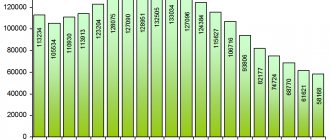Should parents who have been deprived of parental rights pay child support?
Attention. Many irresponsible parents are confident that if parental rights are deprived, they will be able to avoid the obligation to support their child. However, it is immediately worth noting that this opinion is wrong.
In accordance with paragraph 2 of Art. 71 of the Family Code of the Russian Federation, citizens who have been deprived of parental rights retain the obligation to financially support the child until he reaches the age of majority, that is, up to 18 years.
Deprivation of parental rights means a legal procedure in which parents who mistreat their child (evading child support, abusing minors, abusing their position, etc.) are deprived of any authority in relation to him (p. 1, Article 71 of the RF IC).
Thus, the need to pay alimony even after deprivation of parental rights is explained by the fact that in this case the irresponsible father (mother) is deprived only of rights in relation to the minor, but at the same time is not relieved of the obligation to provide for him.
Does deprivation terminate alimony legal relations if you voluntarily abandon the child?
The refusal of a child by parents to raise and support their child does not relieve them of their obligations under the law to provide for him financially . Often the mother abandons the baby in the maternity hospital; in this case, she will pay child support on a general basis even after deprivation of rights until the child is adopted. In case of custody, alimony must also be paid.
The father, by law, cannot renounce his parental rights and responsibilities. Only judicial authorities can deprive rights if there are compelling reasons. Alimony legal relations do not stop. Like the mother, he must pay a maintenance amount.
Child support and child adoption
As a general rule, if a child is adopted, then the obligation of the child’s parent deprived of parental rights to pay alimony ceases, except for the case when, upon adoption of the child, this parent retained personal non-property and property rights and obligations.
In accordance with Article 120 of the RF IC, payment of alimony collected in court is terminated:
- upon the child reaching adulthood or in the event that minor children acquire full legal capacity before they reach adulthood;
- upon adoption of a child for whose maintenance alimony was collected;
- when the court recognizes the restoration of working capacity or the cessation of the need for assistance of the recipient of alimony;
- when a disabled ex-spouse who is the recipient of alimony enters into a new marriage;
- death of the person receiving alimony or the person obligated to pay alimony.
Clause 17 of the Resolution of the Plenum of the Supreme Court of the Russian Federation dated April 20, 2006 N 8 “On the application of legislation by courts when considering cases of adoption of children” contains the following explanations:
“..if alimony was collected from the parent of the adopted child before the decision on adoption was made in court, in accordance with paragraph 2 of Article 120 of the RF IC, he is exempt from paying it. This issue is decided by the court at the request of the parent obligated to pay alimony, according to the rules of Article 440 of the Code of Civil Procedure of the Russian Federation, which provides for the procedure for terminating enforcement proceedings, since a court decision on adoption that has entered into legal force is an unconditional basis for terminating the payment of alimony.
At the same time, the court decision on adoption does not exempt the parent from whom alimony was collected in court from further payment if, when adopting a child, this parent, in accordance with paragraph 3 of Article 137 of the RF IC, retained personal non-property and property rights and obligations. In this case, all issues related to changes in the amount of alimony collected, exemption from their payment, must be considered by the court in the manner of claim proceedings at the request of interested parties.”
Who is eligible to apply for payments?
The answer to this question mainly depends on who exactly was deprived of parental rights. following options are possible:
- One of the parents (father or mother) - in this case, the parent who remains to live with the child has the right to collect alimony through the court (if the other party evades this obligation).
- Both, that is, both father and mother - in such a situation, the collection procedure can be handled by the official guardian of the minor (if any) or the guardianship and trusteeship authorities. The last option is relevant for situations when the baby is sent to an orphanage.
Attention. The procedure for collecting financial support for a child is carried out in court. Moreover, such a claim can be simultaneously initiated as part of a claim for deprivation of rights, or stated in a separate statement of claim.
Collection of alimony from a parent deprived of rights to a child
If the deprived parent refuses to pay child support, it is demanded in court. The size and shape are determined by the district court. Money can be collected either as a percentage of income or in a specific amount.
Depending on the situation, the court makes a decision. In most cases, fixed payments are taken from unreliable citizens, and a percentage is taken from those who have a job and good wages.
The parent raising the child has the right to submit a request regarding the form of transfers. Money is transferred or transferred in the form of cash. In cases where funds are forcibly seized, they are transferred by bailiffs.
If you have not previously been assigned
If previously there was no alimony, for example, the child lived with his parents, but they were deprived of their rights due to cruel treatment, then the court considers the financial situation in the family, the level of income of citizens, their lifestyle and forms an obligation.
As a general rule, if we are talking not about a fixed amount, but about a percentage of income, the parent is obliged to transfer twenty-five percent of his earnings to support the child.
An increase in the amount is permissible if there are several minors, but then it is divided between them, which ultimately reduces the payment per child.
At the legislative level, the following is established - 25% for one child, 30% for two, 50% in cases where there are more than three children per parent. When making calculations, the court takes into account not only the interests of the children, but also the parent. Withdrawal of up to one hundred percent of income is allowed only in case of malicious evasion of obligations.
If previously determined but not paid
For failure to pay alimony, citizens may be subject to civil, administrative and criminal liability. Moreover, they can be assigned simultaneously.
To seize money, bailiffs have the right to use the following methods:
- seizure of bank accounts of the defaulter;
- seizure and sale of property;
- penalties;
- administrative or criminal arrest;
- correctional work;
- restriction of movement – a ban on traveling abroad and confiscation of a driver’s license.
The court sets a certain day on which each month the parent is obliged to make transfers. For late payments, penalties equal to half a percent of the debt are charged. When starting a trial, an additional fee of 7% is charged. All measures are aimed at ensuring that a person, under penalty of liability, complies with the law and makes timely payments for child support.
Deadlines for filing and collection
The law does not indicate the exact time frame within which the procedure for collecting alimony can be initiated. In accordance with paragraph 1 of Article 107 of the RF IC, a person authorized to claim payments of this nature may declare his right at any time. It does not matter how many years have passed since the right to receive alimony arose.
Thus, the official representative of the child (the second parent, guardian or guardianship authorities) can file a claim for the recovery of alimony payments at any time, even if the child is already 18 years old.
However, alimony will be accrued only for the previous 3 years before the moment of going to court (Part 2, Clause 2, Article 107 of the RF IC). Moreover, one important condition must be met: the plaintiff must prove that measures were previously taken to obtain funds for the minor, but the defendant avoided his obligation in every possible way.
Measures in this case mean sending a written appeal to the second parent containing a request to pay alimony or enter into an agreement on its payment, filing an application with the magistrate’s court with a request to issue an order to assign such payments.
How do they pay?
The procedure for transferring alimony in the event of deprivation of parental rights is not particularly different from the generally established procedure. By decision of the court, one of the following options for payment of financial support for the child may be assigned:
- monthly collection of a certain percentage of the salary of the second parent or both (if one child, then 1/4, if two - 1/3, if three or more - 50% of income);
- payment of a fixed sum of money;
- a combination of the previous two options.
Attention. If an agreement is concluded between the parents, it may provide for other options for paying child support (for example, in the form of providing property).
However, in most cases, alimony must be collected from a parent deprived of rights in relation to a child exclusively by force, that is, through the court.
Payment of funds to a minor can be made as follows:
- If a child lives with a second parent or guardian, then the financial support goes to these persons. In the future, they must spend it on the needs of the baby.
- If a minor is in a boarding school , then the alimony collected from his parents is credited to the account of this institution. In this case, these amounts can be placed in a bank (clause 2 of Article 84 of the RF IC).
In the future, when leaving the orphanage, the accumulated funds (minus 50% of the income received as a result of the circulation of this money) will be transferred to a bank account opened in the child’s name. In order to receive them, two important conditions must be met:
- alimony payments and interest accrued on them must be insured;
- the accumulated amount should not exceed the amount of compensation for deposits specified in the Federal Law of the Russian Federation “On insurance of deposits in Russian banks.”
Amount of alimony
A person deprived of parental rights is obliged to pay money for the maintenance of his own child. However, the amount of payment, both minimum and maximum, is not established by law. It will depend on the financial status of the potential payer, as well as on the current costs of the child.
This is important to know: Should a father pay child support if he is deprived of parental rights?
Percentage of income
Usually, if there is an appropriate court decision and the payer receives a fixed salary, then alimony is paid depending on the number of children. For one child, a quarter of the net income is supposed to be transferred, for two – a third, for three or more – 50%.
Fixed payment
If the payer does not have a clear salary or does not work at all, the court may decide to assign a fixed amount that will not be tied to the money received by the person deprived of parental rights. Its size is usually 1/2 of the cost of living for a child in the region of residence, but this is not a mandatory rule. If the second parent with whom the child lives can prove that he spends significantly more on his maintenance, then the amount will be increased accordingly.
Hybrid option
This system is rarely used and involves both a percentage of income and a fixed payment at the same time. It is used mainly when the parent has a relatively small salary, but there are additional sources of income, the profit from which is not possible to calculate.
In what cases is it possible to reduce the amount?
The law provides for the possibility of reducing the amount of alimony payments. Thus, when making such a decision, the court takes into account the following factors (clause 2 of Article 81 of the RF IC):
- material well-being (presence/absence of stable income, permanent job);
- marital status (the total number of children that a person deprived of parental rights has);
- other circumstances that deserve attention.
Important. If the defendant does not have a regular income, problems with employment, and it is also very difficult to withhold a share of his earnings on a monthly basis, then the court may determine the payment of alimony in the form of a fixed sum of money. It can also be reduced (if there are compelling reasons).
Will the father or mother, if they have been deprived of their rights, be able to recover child support benefits from the child in the future?
The answer to this question is strictly negative. As noted above, when parental rights are deprived, the father or mother loses any authority over the child. This also includes the right to demand future financial support from adult able-bodied children. This conclusion follows from clause 1 of Article 71, as well as part 2 of clause 5 of Article 87 of the RF IC.
Thus, a parent who has been deprived of rights to a minor will not be able to avoid the obligation to support him. In any case, he will be required to pay alimony. At the same time, in the future he has no right to count on help from his child, in respect of whom he did not properly fulfill his parental responsibilities.
Procedure for deprivation of parental rights
According to the requirements of Art. 70 of the RF IC, the procedure for deprivation of parental rights takes place in a court hearing. In this case, several parties can make such a statement at once:
- One of the child's parents;
- Guardian;
- Representative of the prosecutor's office;
- Commission on Juvenile Affairs;
- Organizations designed to support and educate orphans.
As a general rule, a claim for deprivation of parental rights is filed at the place of residence of the father (mother) in respect of whom the deprivation procedure is being carried out.
According to the provisions established by Art. 131 of the Code of Civil Procedure of the Russian Federation, the statement of claim must consist of the following parts:
- Introductory part containing:
- name of the court;
- details and personal data of both the plaintiff and the defendant, indicating telephone numbers;
- A descriptive part, which describes in detail the circumstances of the case with references to the rules of law, as well as the evidence to which the applicant refers;
- The pleading part contains the demands that the plaintiff puts forward to the defendant.
In addition to the above, it is necessary to indicate a list of attachments attached to the case materials.
In conclusion, the statement of claim must be signed by the plaintiff or his legal representative and dated.
Article 70 of the Family Code of the Russian Federation “Procedure for deprivation of parental rights”
Article 131 of the Civil Procedure Code of the Russian Federation “Form and content of the statement of claim”






